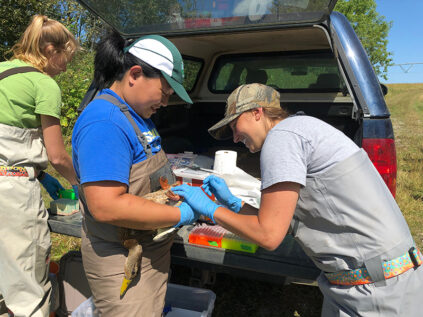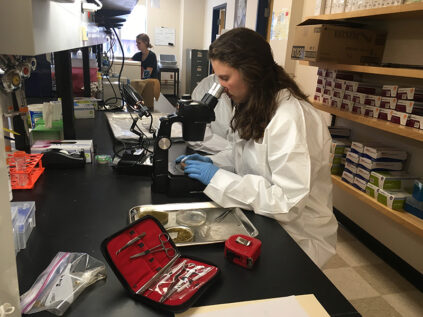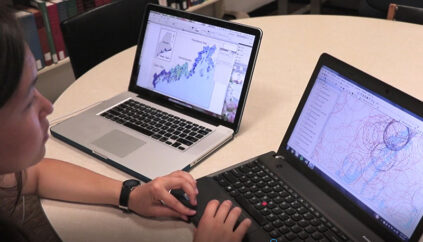Initiative for One Health and the Environment
National Science Foundation Research Traineeship (NRT) - Convergence of Social and Biophysical Sciences to Optimize Training in One Health
**Twenty-one M.S. and Ph.D. assistantships available starting September 2020**
The University of Maine is launching a new interdisciplinary graduate training program in One Health and the Environment. This is a joint program between the Schools of Biology and Ecology; Economics; Food and Agriculture; Forest Resources; and Marine Sciences; and the Departments of Communication and Journalism and Wildlife, Fisheries and Conservation Biology; and the Climate Change Institute.
Environmental changes, aging human populations, and increasing diseases of animals, plants and people (e.g., Lyme disease, methylmercury-based neurological impairment, citrus greening disease) highlight the need for training professionals in an interdisciplinary “One Health” approach: studying disease dynamics at the intersection of human, animal, plant, and environmental health. Addressing the connections between animal, plant, and human health under a changing environment will help advance the basic science while also generating innovative solutions to critical health problems.
This NRT addresses these problems by training graduate (master’s and doctoral) students in the interdisciplinary field of One Health. Trainees will: 1) be trained in social, biophysical and health sciences; 2) participate in intensive internships with health-related business, policy and non-profit partners; and 3) be mentored in a culture of innovative, solutions-driven, multidisciplinary research.
The traineeship will encourage interdisciplinary research by having all trainees conduct their research in the context of two major research questions: 1) What are the social, economic, and ecosystem drivers of health dynamics? and 2) How do we lead policy and management innovations to improve health outcomes? Through close interactions with internship partners outside of academia, the trainees will expand their boundaries to consider, not just the underlying science, but also the management and policy challenges in developing solutions to One Health problems. Training in cross-disciplinary communication will enable trainees to engage with diverse scientific communities, stakeholders, citizen scientists, and the public.
Trainees will have the opportunity to pursue diverse research topics that span the natural and social sciences. For research examples and further information about the faculty mentors, please visit our Faculty Page.
The goal of this NRT is to create a highly integrated learning environment in which graduate trainees become convergent One Health researchers with the ability to use multiple approaches and develop new integrated approaches to tackle complex One Health problems. Our training program is designed to create graduates who:
- Become experts in their disciplinary field, while developing strength in another discipline;
- Work collaboratively in transdisciplinary teams of peers and stakeholders;
- Develop communication skills to successfully engage with diverse audiences;
- Acquire knowledge & skills to develop innovative solutions to One Health problems; and
- Acquire professional skills to enable successful careers in and out of academia.
Sequenced coursework provides exposure, immersion and mastery in three areas: the One Health problem space, design and implementation of One Health solutions, and practice of convergence research. Trainees improve communication and stakeholder engagement skills via workshops and peer writing groups. Trainees develop, and work in interdisciplinary research teams to implement, immersive convergent projects.
The 21 trainees funded in this program can receive an annual stipend of $34,000/year for at least 2 years (PhD students) or one year (MS students), plus free tuition and fees, and subsidized health insurance coverage. Students must be U.S. citizens or permanent residents to receive NRT funding. As part of the National Science Foundation’s and our commitment to broadening participation, we especially encourage women, underrepresented minorities, first-generation students, veterans, and students with disabilities to apply.
Prospective trainees can apply through the graduate school to several degree programs:
- School of Biology and Ecology: MS in Botany and Plant Pathology, Entomology or Zoology; PhD in Biological Sciences or Zoology; interdepartmental Ph.D. program in plant sciences;
- Climate Change Institute: MS in Quaternary and Climate Studies
- Department of Communication and Journalism: MA or PhD in Communication
- School of Economics: MS in Economics or Resource Economics and Policy;
- School of Food and Agriculture: MS in Animal Science;
- School of Forest Resources: MS or PhD in Forest Resources;
- School of Marine Sciences: MS or PhD in Marine Biology; MS in Marine Policy; dual MS in Marine Biology and Marine Policy;
- Department of Wildlife, Fisheries, and Conservation Biology: MS or PhD in Wildlife Ecology
- All of the above units also support students in the interdisciplinary Ecology and Environmental Sciences Program where you can obtain an M.S. or PhD in Ecology and Environmental Sciences. For many students, this program may be preferred as it allows more flexibility to incorporate the traineeship’s course and internship requirements.
If you are interested in applying to the One Health and Environment traineeship, then you are strongly encouraged to first reach out to a faculty members via email (see Faculty page) to discuss your interests, learn more about their research program, and inquire about the possibility of their serving as your graduate advisor.
In the graduate school application, you will be asked to submit a personal statement; please include in your statement: why you are interested in your desired degree program and interested in the traineeship, your experience working in interdisciplinary teams and the faculty you would like to work with.
Please direct any general questions you have about the traineeship to Mario Teisl at teisl@maine.edu.



